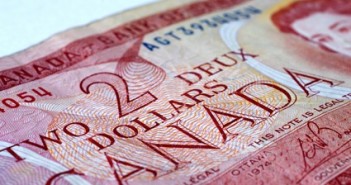Justin Trudeau was swept into power in Canada, winning an outright majority and beating the decade long PM Stephen Harper. This implies changes of policy:
Avery Shenfeld of CIBC World Markets explains:
Here is their view, courtesy of eFXnews:
The ballot counting will continue late into the night, but Canada’s federal election looks to be bringing a changing of the guard in Ottawa. Here is the first reaction from CIBC World Markets.
What Will be Different?
The Liberals have a long track record of governing Canada, but this will be Justin Trudeau’s first term as Prime Minister. The party’s election platform was fairly detailed, and with a majority government the Liberals have been given a mandate to implement those proposals.
Key planks in the Liberal platform from a macro-economic perspective include:
Ramping up spending more than revenues, and thereby allowing the budget to run a deficit peaking at roughly 0.5% of GDP for two years (just under $10 bn) with a balance by 2019/20, as opposed to the balanced budget plan of the outgoing Conservatives.
Additional spending focused on infrastructure, along with training, environment, CBC, native Canadians, veterans, etc.
Replacing the existing structure of personal income taxes and benefits in a manner that increases net taxes on upper income earners and provides lower taxes or more support to middle- and lower-income households. These include changes to family benefits and income splitting, tax-free savings account (TFSA) limits, and personal tax brackets.
Key microeconomic/regulatory planks include:
Let provinces design own approaches to carbon reduction
Supports pipelines other than Northern Gateway
Seem to lean towards supporting Trans Pacific trade deal
Enhanced CPP program
Lower cost alternative to F-35 fighter jet
Financial Market Implications:
A decision to add a modest dose of fiscal stimulus reduces the need for an additional rate cut from the Bank of Canada, and could therefore push up short rates slightly given that they price in some odds of such a cut. That could in turn be a bit supportive for the Canadian dollar, although there was little initial reaction in the currency as the election results rolled in. The key to any spread or ratings implications would be the credibility of a plan to subsequently reduce deficits in the future. As targeted, the federal deficits would still be very modest by global standards.
Equities in the engineering/construction space could benefit from the ramp-up of spending in that area. A more progressive tax system should support middle-income consumption at the expense of the types of spending favoured by higher-income earners. Investors might take note of that in some consumer-related equities.
An enhanced CPP could cut into some savings flows into plans offered by financial institutions like RRSPs, although it will be less material for high net worth segments. The financial sector would also not see the ramping-up of greater flows into TFSAs. But note that Ontario was in the process of developing an alternative pension plan that might be moot if the federal government goes ahead. Tax/benefit savings for lower- and middle-income households could have some benefits for credit quality in the household sector.
Increasing after tax incomes at the lower end typically lead to greater consumption and reduced savings, given the higher propensity to spend at lower incomes. Against that is the disincentives to labour supply as marginal tax rates increase, although the end of income splitting would lower effective marginal rates for a second income earner.
The Liberals are supportive on some pipeline projects, but there are uncertainties on how carbon policies will play out for the energy sector. That would have been the case under any election outcome given the Paris negotiations that lie ahead and the role that provinces are now playing in carbon policy.
Avery Shenfeld – CIBC World Markets
For lots more FX trades from major banks, sign up to eFXplus
By signing up to eFXplus via the link above, you are directly supporting Forex Crunch.
